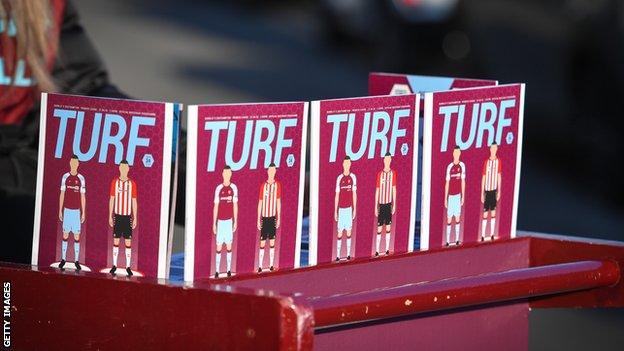Gambling logos in half of children's sections of club programmes - study
- Published

Last season nine Premier League teams had betting sponsors on their shirts
Gambling sponsors feature in more than half of children's sections in football club programmes, says a new study.
The study looked at programmes for 44 Premier League and Championship teams over three periods spanning 18 months.
It found 56.8% of dedicated children's sections contained incidences of gambling marketing such as shirt logos.
Adverts dropped from 2.3 incidences per programme to 1.3 but the "incidental exposure" of gambling logos was constant at 42.7 times per programme.
Gambling messages were 13 times more common than alcohol marketing or safer gambling messages.
The longitudinal study, external found teams sponsored by gambling companies had almost twice as many adverts per programme than those sponsored by other industries (2.3 versus 1.2).
A ban on gambling sponsors on shirts has been discussed by the government before a white paper, due this month, to make laws "fit for the digital age".
BBC Sport has been told a draft white paper included a shirt sponsor ban for solely Premier League teams, but campaigners said that would be "incoherent" if not also applied to teams in the English Football League and for other types of sponsorship.
The study by authors Steve Sharman, Catia Alexandra Ferreira and Philip Newall said: "Researchers and policymakers should consider that sports fans can get exposed to gambling marketing through a number of channels outside of TV advertising.
"Indirect and incidental exposure to gambling marketing remains high, which can be particularly challenging for those experiencing gambling-related harm. All forms of gambling marketing must be considered when making legislative changes."
James Grimes, of The Big Step - which campaigns to end gambling advertising and sponsorship in football - said: "Gambling sponsors are gambling adverts, and having so many in a kids' section of a programme is not normal and not safe.
"Children should be able to follow their club without seeing any.
"An end to all gambling advertising in football would significantly reduce the amount of influential nudges to gamble that kids have to endure on a daily basis."
A recent YouGov survey said 1.4m people in Britain are being harmed by gambling, with a further 1.5m at risk.
But the Premier League and EFL believe there is no evidence to show a causal link between gambling sponsorship and problem gambling.
A spokesperson for the Betting and Gaming Council said: "The regulated betting and gaming industry provides some of the country's most popular sports with vital funding, including the English Football League, which receives £40m.
"The government has previously stated research did not establish a causal link between exposure to advertising and the development of problem gambling.
"The whistle-to-whistle ban has reduced the number of TV betting commercials viewed by children during live sports before the watershed by 97 per cent.
"We are encouraged by the latest figures from the Gambling Commission that showed the rate of problem gambling was 0.2 per cent of the population - down from 0.4 per cent the year previous."

'It's about allowing the story to tell the director': Did you know these nine things about Armando Iannucci?
Troy Deeney's story: Learn about his complicated relationship with his father, who was always on the edge of the law
